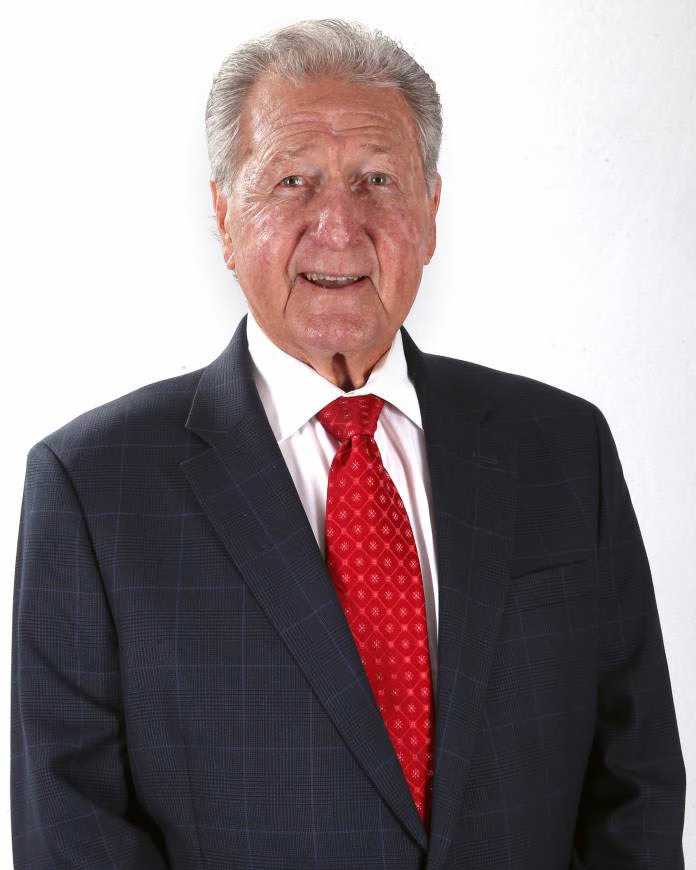By Bailey Muselwhite Ole Miss IMC Student
There are so many men and women who have impacted the University of Mississippi in various ways. Many have left legacies that impact the world every day. There are few as humble about their success as Ole Miss two-sport All American, Jake Gibbs.
I am from Grenada, Mississippi. So is Jake Gibbs. He is someone I grew up hearing about from my grandparents, and they had lots of stories about him.
Gibbs was a hometown hero. He played six years of Grenada High School baseball starting in the seventh grade. His first position was second base. Most of his childhood teams consisted of his family members, including his brother, Bobby Gibbs.
In addition to his baseball talents, Gibbs also played football in high school. Wanting to further his football career, he had the option of choosing between Ole Miss or Mississippi State.
“I wanted to continue my football playing days, so I decided to come to Ole Miss to play for Coach Johnny Vaught,” Gibbs said.
Few college football programs in America were having the success that the Rebels were at the time. It was at Ole Miss that Gibbs’ fame really began to grow.
To please his parents’ wishes by earning a college education, Gibbs took the available opportunity to come to Ole Miss to play both sports in 1957. Managing to play two sports in college is one thing. Excelling as he did in both is quite another. He learned early he would have to budget his time and think ahead, like when it came to practice.
“Myself and a few other players would take our football shoulder pads and helmets to baseball practice with Coach (Tom) Swayze for about two hours, then we’d go ‘down the hill’ for Coach Vaught’s football practice,” he said.
Both the football and baseball programs were highly successful when Gibbs played. The football team won an SEC Championship, and the baseball team won the SEC twice.
Vaught and Swayze taught the basic fundamentals of football and baseball, while being well organized and fun to play for, according to Gibbs.
“They taught the game, they taught you how to respect the game, and how to love the game,” Gibbs said.
With skills learned from Coach Vaught and his staff, Gibbs and the Rebels faced off in a rematch game against their rival, the LSU Tigers, in the 1960 Sugar Bowl. They had lost the regular season game two months earlier to the Tigers 7-3 in Baton Rouge and were determined to prove they were the better team.
In the regular season game on Halloween night, a Gibbs fourth-quarter punt was returned 89 yards by eventual Heisman Trophy winner Billy Cannon. The Rebels had a chance to win late as they got deep in Tiger territory but couldn’t score.
So with emotions running high, New Orleans was the site of the rematch. Gibbs, at quarterback, recalls throwing a 43-yard pass for a touchdown, after a scoreless first quarter of play. The Rebels achieved their goal of proving the first matchup was basically a fluke with a 21-0 victory on New Year’s Day, again in the Tigers’ home state.
The following season, Gibbs’ senior year, Ole Miss won the SEC football title and he finished third in the Heisman Trophy race.
Gibbs chose baseball after college and he signed with the Yankees in May of 1961. He began in Richmond, Virginia, as a third baseman playing 106 games that year for the Yankees’ Triple A team, The Richmond Virginians.
“In 1963, my life changed a little bit, and they wanted me to play catcher,” Gibbs said.
At 24 years old, he had to learn a new position. He was in a position of legends, replacing Elston Howard who had replaced Yogi Berra.
“I guess I got lucky and they called me up,” Gibbs said. “I spent 11 years in the Yankee Organization, seven in the big leagues.”
Gibbs had a batting average of .233, 25 home runs, and 146 runs batted in.
“It was a great organization, great people,” he said. “It was fun to be in New York, and it was fun to be a Yankee.”
After the season of 1965, Gibbs found himself back at home in Grenada. He decided to attend an Ole Miss football practice one afternoon. Vaught asked him if he would be interested in helping coach the Rebel quarterbacks in preparation for the Vanderbilt vs. Ole Miss game coming up. This led to Gibbs coaching Rebel quarterbacks for the next five years during the Yankees’ offseason.
Gibbs retired from the Yankees in 1971. He became head baseball coach for the Ole Miss Rebels from 1972 through the 1990 season. He took Ole Miss to the College World Series in his first season, and the Rebels won the first SEC Tournament ever played in 1977. It was hosted by Ole Miss.
On opening day of this year’s shortened college baseball season, the Ole Miss athletics department unveiled Jake Gibbs’ retired jersey number, 41, on the outfield wall of Swayze Field, which is named for his former coach.
Gibbs threw out the first pitch of the 2020 Ole Miss baseball season, and if you visit Swayze Field, his jersey can be seen on the wall in left center field.
During my conversation with him, Jake Gibbs expressed gratitude for all the opportunities he was given that all started in his hometown.
From one hometown Grenadian to another, Gibbs said, “Life’s been good to me.”

